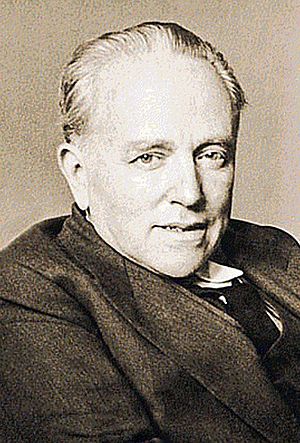Raúl Porras Barrenechea facts for kids
Quick facts for kids
Raúl Porras Barrenechea
|
|
|---|---|
 |
|
| Minister of Foreign Affairs | |
| In office 4 April 1958 – 12 September 1960 |
|
| President | Manuel Prado Ugarteche |
| Preceded by | Victor Andres Belaunde |
| Succeeded by | Luis Alvarado Garrido |
| Personal details | |
| Born | 23 March 1897 Lima, Peru |
| Died | 27 September 1960 (aged 63) Lima, Peru |
| Alma mater | National University of San Marcos |
| Occupation | Diplomat, historian and politician |
Raúl Porras Barrenechea (born March 23, 1897 – died September 27, 1960) was an important Peruvian figure. He was a diplomat (someone who represents their country), a historian (someone who studies the past), and a politician (someone involved in government).
He served as the President of the Senate (a part of Peru's government) in 1957. Later, he became the Minister of Foreign Affairs (Peru's top diplomat) from 1958 to 1960. Raúl Porras Barrenechea was known for his work in history and for representing Peru on the world stage.
Contents
Biography
Early Life and Education
Raúl Porras Barrenechea was born in Pisco, Peru on March 23, 1897. He came from a well-known family. His uncle, Melitón Porras, was a famous diplomat and even a former Prime Minister. His grandfather, José Antonio Barrenechea, also served as Minister of Foreign Relations many times.
Raúl went to school at the Recoleta Sacred Heart School in Lima. He then studied at the University of San Marcos. There, he earned a law degree in 1922. In 1928, he received a doctorate in philosophy, history, and literature.
While at San Marcos, Raúl was a key leader among students. He was part of a group called the "Centenary Generation." He also represented students at international meetings in cities like La Paz, Buenos Aires, and Mexico City. He was active in a movement to improve universities.
Diplomatic Career
In 1919, Raúl Porras Barrenechea became the personal secretary to the Minister of Foreign Affairs. He later worked as the Ministry's librarian in 1922. In 1924, he advised the Peruvian team during talks about the Tacna-Arica Affair. This was a discussion about a border area.
In 1926, he became the head of the Archive of Limits. This department handled maps and borders for the Ministry. He also represented Peru at the Centenary of the Panama Congress.
In 1934, Raúl Porras moved to Europe. In Spain, he did research in important historical archives. These included the General Archive of the Indies and the National Historical Archive.
The next year, he became a Counsellor for Peru in Madrid. In 1936, he was appointed Peru's representative to the League of Nations in Geneva. This was an international organization that worked for peace. He held this position until 1938. Before returning to Peru in 1940, he helped edit some works by the poet César Vallejo in Paris.
Academic and Political Roles
In 1928, Raúl Porras became a professor at San Marcos University. He taught Spanish literature, history of Peru, and diplomatic history. In 1933, he also started teaching at the Catholic University of Lima. During these years, he wrote many historical books about Peru's colonial past.
In 1941, he became an adviser to the Ministry of Foreign Affairs. He was also made Chief of the Press Office. He was later promoted to Minister Plenipotentiary in 1942 and Ambassador in 1944.
In 1944, he joined the Hispanic Society of America. He won the National Prize of History in 1945. In 1948, he became the Ambassador to Spain. After returning to Peru in 1950, he became the Director of the Institute of History at San Marcos. He was also chosen to be President of the Peruvian Institute of Hispanic Culture.
In 1956, he was elected as a Senator in Peru. That same year, he became Vice President of the Senate. In 1957, he served as President of the Senate for six months. This happened after the death of José Gálvez Barrenechea.
Minister of Foreign Affairs
In 1958, President Manuel Prado chose Raúl Porras to be the Minister of Foreign Affairs. He continued his duties even though he had some health problems.
As Minister, he attended the United Nations General Assembly meetings in 1958 and 1959. He also traveled with President Prado on official visits to France, Italy, and Germany in 1960. In August 1960, he attended a conference in Costa Rica. There, he gave an important speech against the new U.S. involvement in Cuba.
Raúl Porras Barrenechea became very ill. He resigned from his position on September 12, 1960. He passed away fifteen days later, on September 27, 1960, at the age of 63.
See also
 In Spanish: Raúl Porras Barrenechea para niños
In Spanish: Raúl Porras Barrenechea para niños
Works
- Historia de los Límites del Perú: Texto dictado a los alumnos del Colegio Anglo-Peruano de Lima, conforme al programa oficial. (Lima: F. y E. Rosay. 1930)
- Las relaciones primitivas de la conquista del Perú. (Paris: Impr. Les Presses modernes. 1937)
- El Inca Garcilaso de la Vega (1539–1616) (Lima: Lumen. 1946)
- Relación de la descendencia de Garci Pérez de Vargas (1596). Inca Garcilaso de la Vega. Reproducción facsimilar del manuscrito original con un prólogo a cargo de Raúl Porras Barrenechea. (Lima: Instituto de Historia. 1951)
- El Inca Garcilaso, en Montilla, 1561–1614" : nuevos documentos hallados y publicados. (Lima: Instituto de Historia-Editorial San Marcos 1955)
- El Paisaje Peruano de Garcilaso a Riva Agüero. (Lima: Imprenta Santa María. 1955)
- Cartas del Perú, 1524–1543. (Lima: Sociedad de Bibliófilos Peruanos. 1959)
- Antología del Cusco. (Lima: Librería Internacional del Perú. 1961)
- Fuentes Históricas Peruanas: Apuntes de un curso universitario. (Lima: Instituto Raúl Porras Barrenechea. 1963)
- Los Cronistas del Perú. (Lima: Sanmartí Impresores. 1962)
- Pizarro (Lima: Editorial Pizarro. 1978)
 | Toni Morrison |
 | Barack Obama |
 | Martin Luther King Jr. |
 | Ralph Bunche |

